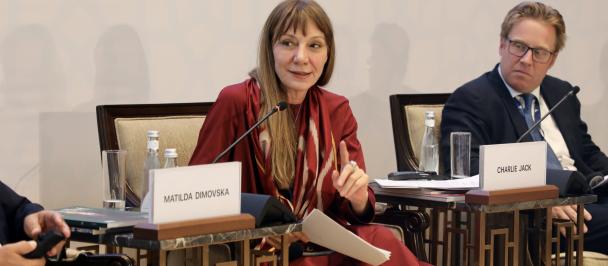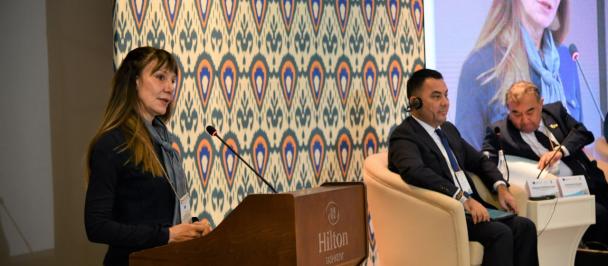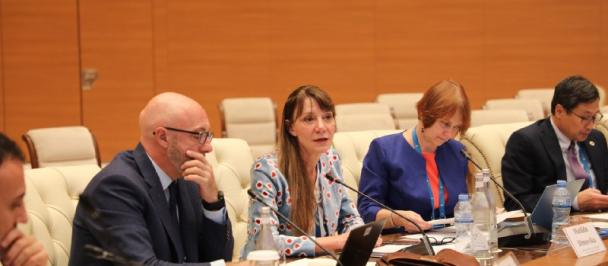“Tashkent – Accelerating Investments in Low-Emission Vehicles (TAILEV)”
Statement by Matilda Dimovska, UNDP Resident Representative in Uzbekistan at the Inception Workshop of the joint project of UNDP/GEF and Ministry of Transport of the Republic of Uzbekistan
September 29, 2022
Muhtaram janob Choriev, hurmatli honimlar va janoblar, Assalomu aleykum.
I am very pleased to welcome you on behalf of United Nations Development Programme at this Inception Workshop of the newly initiated project - “Tashkent - Accelerating Investments in Low Emission Vehicles”.
It is to support accelerated adoption of electric vehicles - that would significantly reduce greenhouse gas emissions in the transport sector in Uzbekistan and improve the quality of urban environment.
Global and national context of promotion of electromobility
Transportation in an important contributor to development, as it enables trade, commerce, and communication. But today’s transport sector is almost completely dependent on fossil fuels, is responsible for around 25% of carbon dioxide emissions, and largely contributes to air pollution in particular in cities;
Moreover, it is fastest-growing greenhouse gas emitting sector – it is forecasted that future total GHG emissions would reach over 30%;
This doesn’t have to be the case. Among the solutions, electrification of transport is critical for emissions reductions at the scale necessary to decarbonize the sector – by reducing its dependence on fossil fuel;
Over the last 20 years, electric vehicles have seen significant technological advancements that have not only lowered their costs but also reduced their environmental footprint and increased their utility.
Still, despite the potential benefits of electro-mobility, electric vehicles represent little over 2% of global vehicle sales and a small share of the global vehicle fleet;
It is therefore essential that all, and particularly low/middle-income countries are part of a global shift to zero emissions electric mobility.
In 2018, when UNDP was initiated development of a project idea on promotion of electro public transport in Uzbekistan and discussed with the relevant national agencies, this looked like a very long-term prospective.
However, today in 2022, we are witnessing rapid development of e-vehicle sub-sector in Uzbekistan:
- according to the State Statistics Committee: during January-June 2022 - 1,125 electric vehicles worth $34.1 million were imported to Uzbekistan; this is 4.5 times more than in the first six months of 2021;
- import of electric vehicles is exempted from customs duties and fees;
- since November 2021, green plates are provided for electric vehicles;
- infrastructure for electric transport is being developed by private sector; currently there are about 50 charging stations in Uzbekistan;
- Tashkent public transport procured 20 electric buses, operated at 4 routes;
At policy level, in February this year the President called for development of a national strategy for electric car industry development. This includes local production of electric vehicles, development of technical requirements and standards for them, and development of the state program for establishing a network of public charging stations.
Number of other developments recently took place, for example:
- Production of electric vehicles was launched in Fergana in 2021, the first test batch of e-cars was produced, and full capacity mass production is planned in 2022
- Establishment of a Green Economy Development Fund is considered – to be capitalized from environmental tax of traditional (not electrical) cars.
All these are in support of the ambitious commitments made by Uzbekistan in its second NDC, announced in COP26 in Glasgow in November 2021. It included a target of development of electric transport by 2030.
UNDP supports national efforts in acceleration adoption of e-mobility public transport
Implementation of it is most important. Therefore, UNDP supports the relevant institutions in realizing the NDC commitments, and in general the green transition of Uzbekistan.
Public transport is a key for efficient transportation in cities, its greening is integral part of a carbon-neutral development of the overall transport sector.
This project promotes systemic approach to public transport, built on three key pillars:
- design, implementation and operation of a pilot green urban transport corridor (GUTC) in Tashkent with a fleet of electric buses;
- shifting the transport market towards low-carbon e-mobility and adoption of green urban transport corridor approach based on evidence of the associated environmental, financial and social benefits;
- measures and actions to ensure long-term sustainability of electromobility transport sector but based on institutional framework and strategy for promotion of gender-inclusive low-carbon electric mobility and green urban transport system in all cities of Uzbekistan.
This is first project focused on the transport sector with involvement of UNDP in Uzbekistan. Its implementation is owned by the national partner – Ministry of Transport, while the demonstration sites in Tashkent City are to be carried out by the City Public Bus Company with support of the Municipality of Tashkent.
In UNDP, we do have our internal commitments – our global target is to reduce our greenhouse gas emissions by 25% by 2025 and 50% by 2030 - through reducing GHG emissions associated with air travel, facility energy and vehicle fuel.
We’re making good progress on facility energy use, and now step in reduction of our vehicle emissions. We have a Fleet Management Tool in support of efficient vehicles use and an updated vehicle policy that requires that all new representation vehicles are electric (or hybrid where electric is not feasible). And this is greatly resonating with this new project.
Today we will review the first insights and directions of the project as well as linkages to related global initiatives. The partners, stakeholders and beneficiaries will be able to familiarize with the project, discuss their roles, functions and the extent of their responsibility.
Let me wish to us all an active and constructive work.
E’tibor uchun katta rahmat! Thank you for your attention!

 Locations
Locations

